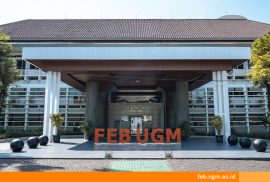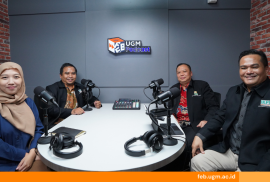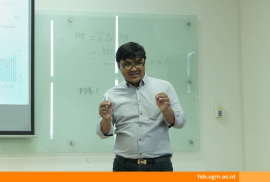Saturday (4/10), the FSDE Seminar 2023, titled “Advance to Ibu Kota Nusantara: Indonesia’s Initial Attempt to an Equitable Economy and Sustainable Development”, was held. The event occurred at the Soekadji Ranuwihardjo Auditorium at Master of Management (MM) Building of the Faculty of Economics and Business, Universitas Gadjah Mada (FEB UGM). This seminar was part of The 18th Forum Studi dan Diskusi Ekonomi (FSDE), an annual event organized by the Student Association of Economics (Himiespa) FEB UGM. Three speakers participated in this seminar: Faisal H. Basri, S.E., M.AA (Senior Economist from the University of Indonesia), Dr. Onesimus Patiung, S.Hut., M.P (Director of Environmental Affairs and Disaster Management of the Capital City), and Drs. Andrinof Achir Chaniago (Former Head of the National Development Planning Agency).
The event began with a prayer and the singing of the Indonesian national anthem and the Gadjah Mada University hymn. Then, a performance from the Gadjah Mada Chamber Orchestra entertained the audience. Afterwards, Muflih Irfan Luthfi, Chairman of the 18th FSDE, delivered a welcoming speech, followed by Rimawan Pradiptyo, Head of the Department of Economics, FEB UGM, who gave an opening address. The seminar sessions were moderated by Muhammad Ryan Sanjaya, Secretary of the Economics Program, Universitas Gadjah Mada.
First Session: IKN and National Economic Integration
The first speaker, Faisal H. Basri, discussed Indonesia’s unique status as the world’s largest archipelagic country, with two-thirds of its total area covered by water and the second longest coastline globally. Despite this, maritime transport contributions and logistics efficiency have been declining, leading to a drop in Indonesia’s Logistics Performance Index (LPI) from 46th to 61st place globally. This maritime nature has caused economic disintegration. The question was whether relocating the capital city, IKN, could address this disintegration.
Currently, economic development is concentrated in Java. The IKN relocation plan, initiated in 2019, aimed to shift the economic focus. However, the financing from foreign investors has not materialized, and the funding still relies on the national budget. Moreover, estimations by the Institute for Development of Economics and Finance (INDEF) suggest that IKN could negatively impact the economy. Thus, the government must consider the economic aspects of relocating the capital to Kalimantan.
Second Session: Impact of IKN Development on Environmental Damage
Dr. Onesimus Patiung, Director of Environmental Affairs and Disaster Management of the Capital City, discussed the environmental sustainability aspects of the IKN development. He explained that the IKN relocation to Kalimantan aligns with inclusive and sustainable economic growth goals. The IKN development will utilize only 65% of the total area; the remaining land will be returned as tropical rainforest (reforestation) or used for food production.
Furthermore, environmental conservation efforts are supported by establishing eight key performance indicators (KPIs) related to various indicators. The development of IKN has also considered potential ecological impacts, emphasizing concepts like Forest City (dominated by forests), Sponge City (enhancing absorption to prevent floods), and Smart City (utilizing technology). Environmental impact mitigation efforts include implementing ecological agreements, as stated in Article 11 of Law Number 6 of 2023.
Third Session: Reasons for Relocating the Capital City to Kalimantan and Political Challenges
The final speaker, Drs. Andrinof Achir Chaniago, Former Head of the National Development Planning Agency, explained the complex socio-economic issues in Jakarta and Java, such as urbanization-related problems like traffic congestion and food supply issues. Additionally, land use changes in Java threaten the nation’s food security. Thus, the redistribution of development is a goal of capital relocation.
On the other hand, the move is expected to optimize the natural resource potential in Eastern Indonesia. These reasons form the foundation of the IKN project initiated by the government. The session concluded with a discussion between speakers and the audience, marking the end of the event.
Reported by: Rizal Farizi
Watch the full video at https://www.youtube.com/live/_BIJgG9oKfY






